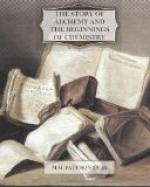In The Chemical Treatise of Thomas Norton, the Englishman, called Believe-me, or the Ordinal of Alchemy (15th century), the adept is warned not to disclose his secrets to ordinary people.
“You should carefully test and examine the life, character, and mental aptitudes of any person who would be initiated in this Art, and then you should bind him, by a sacred oath, not to let our Magistery be commonly or vulgarly known. Only when he begins to grow old and feeble, he may reveal it to one person, but not to more, and that one man must be virtuous.... If any wicked man should learn to practise the Art, the event would be fraught with great danger to Christendom. For such a man would overstep all bounds of moderation, and would remove from their hereditary thrones those legitimate princes who rule over the peoples of Christendom.”
The results of the experimental examination of the compositions and properties of substances, made since the time of the alchemists, have led to the modern conception of the chemical element, and the isolation of about seventy or eighty different elements. No substance now called an element has been produced in the laboratory by uniting two, or more, distinct substances, nor has any been separated into two, or more, unlike portions. The only decided change which a chemical element has been caused to undergo is the combination of it with some other element or elements, or with a compound or compounds.
But it is possible that all the chemical elements may be combinations of different quantities of one primal element. Certain facts make this supposition tenable; and some chemists expect that the supposition will be proved to be correct. If the hypothetical primal element should be isolated, we should have fulfilled the aim of alchemy, and gained the One Thing; but the fulfilment would not be that whereof the alchemists dreamed.
Inasmuch as the alchemical Essence was thought of as the Universal Spirit to whose presence is due whatever degree of perfection any specific substance exhibits, it followed that the more perfect a substance the greater is the quantity of the Essence in it. But even in the most perfect substance found in nature—which substance, the alchemists said, is gold—the Essence is hidden by wrappings of specific properties which prevent the ordinary man from recognising it. Remove these wrappings from some special substance, and you have the perfect form of that thing; you have some portion of the Universal Spirit joined to the one general property of the class of things whereof the particular substance is a member. Then remove the class-property, often spoken of by the alchemists as the life, of the substance, and you have the Essence itself.
The alchemists thought that to every thing, or at any rate to every class of things, there corresponds a more perfect form than that which we see and handle; they spoke of gold, and the gold of the Sages; mercury, and the mercury of the Philosophers; sulphur, and the heavenly sulphur of him whose eyes are opened.




